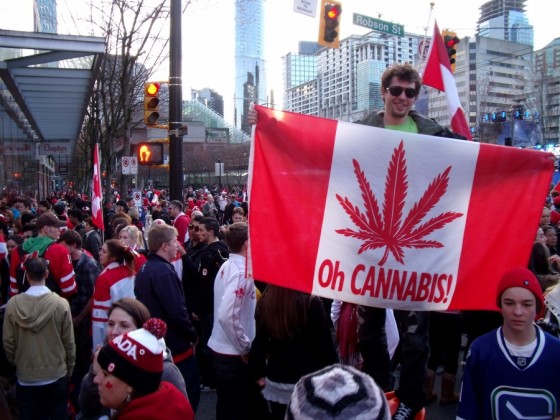MARIJUANA: Canada unlikely to react to U.S. legalized states, say experts
If you’re hoping to fire one up at a marijuana café near you any time soon, don’t get your hopes up: experts in Canada’s marijuana trade say legalizing the drug in a pair of U.S. states won’t lead to significant policy changes in Canada this year.
They expect the federal government will stick with its pledge of cracking down on marijuana production regardless of the arguments presented to it, even if the social experiments in Washington State and Colorado yield positive results.
“When it’s an ideological issue, it often depends on the party in power,” said Prof. Geraint Osborne, a crime expert at the University of Alberta’s Augustana campus.
“It’s usually couched in terms of getting tough on crime, because that’s a position that’s popular with the Conservatives’ voting public. They’re not thinking critically about it, nor are they realizing that it’s the war on drugs causing the crime; it’s prohibition that leads to gang-related crime because of the profits from a black market, just as was the case during the U.S. prohibition on alcohol.”
Osborne has authored two extensive papers on marijuana use among the Canadian public. His research clearly showed most abuse is among people with deeply seated emotional and psychological problems, usually coming from broken homes. But with fewer than 8% of Canadian marijuana smokers using the drug chronically, he said, it’s obvious Canada’s laws won’t deter people from doing something they consider largely harmless.
Without exaggeration, Osborne says, it’s hard to find an academic left in the country – or anyone who has studied both sides of the issue – who thinks the current regime is working. That’s not because the country is full of potheads, he said.
“Most of the people I talk to about this, they’re not advocating for more drug use or for cannabis at all. They’re just saying that we as a nation have to recognize there are many in society who treat pot responsibly, just as there are many who treat alcohol responsibly. And the ones who abuse these things need help, not jail.”
The nation has spent billions of dollars enforcing anti-marijuana laws over the last Century but usage and availability have generally increased, notes Osborne. In fact, over the last three years marijuana arrests in the U.S. have actually declined slightly, for the first time ever, even as they’ve increased here. Most of those are for personal possession. The U.S. and Canada lag behind countries like Britain and Switzerland for punishing marijuana offences … but only because the issue has already been decriminalized there, giving police the opportunity to ticket public use without having to waste time in court.
Osborne notes that the governing Conservatives are the only federal party remaining opposed to decriminalization. The government reiterated that position after the U.S. federal election, hiking penalties for dealers and saying in a written statement that it “does not support the decriminalization or the legalization of marijuana.”
Eugene Oscapella is equally convinced it will take a change in government. An Ottawa lawyer who has never smoked pot, he nevertheless crusades for its legalization on behalf of the Canadian Foundation for Drug Policy.
“It’s stupid and venal,” he says. “About a third of the U.S. population now has decriminalized marijuana and yet in Canada there is no decriminalization at all. Right now it’s still a criminal offence across the board unless your use is medical. So in some ways we’re worse off than the United States.”
It’s not a matter of right-and-left ideologically so much as conservative versus liberal, it would seem. The right-wing, libertarian CATO institute, for example, calls marijuana prohibition a complete failure.
“The data show that, judged by virtually every metric, the Portuguese decriminalization framework has been a resounding success. Within this success lie self-evident lessons that should guide drug policy debates around the world,” constitutional lawyer Glenn Greenwald concluded in a CATO report on the European nation’s progress.
Key to the debate still, of course, is the medical profession, which is torn between treating problem users and being seen to endorse the use of a harmful substance. Deterrence may also play more of a role with youth than adults, as self-reported usage among youth declined to 9% during the period Canada’s arrests were increasing, its lowest level ever. Supporting the argument were similar declines during the Conservative crackdowns of the 80s, when self-reported use among youths fell to just 12%. By 2003, it was up to 27%.
Oscapella argues that might be deceiving; reporting may have decreased, but the trade was still booming in those years.
He asks, “Is there a causation link there? Or are kids just less reluctant to be honest when the police are arresting more people?”
Tom Stamatakis, president of the Canadian Police Association, told media after the U.S decisions that Canada does not have “the tools and the training available to us now to ensure that people aren’t driving cars, for example, or operating machinery, while they’re impaired by marijuana. There are all kinds of implications that I don’t think people are considering carefully enough.”















